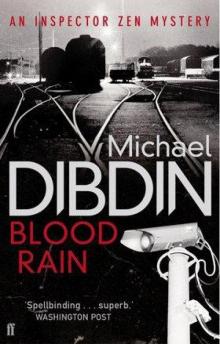Read Blood Rain - 7 Storyline:
Amazon.com ReviewPenzler Pick, May 2000: Dibdin's six Aurelio Zen novels (beginning with Ratking, which won the 1988 Golden Dagger Award) are as vividly Italian as if this English writer had never strayed far from the Via Veneto, despite the fact that he has, in fact, been expatriated for several years now to the Pacific Northwest. His hero, a battle-weary but still morally engaged Roman police investigator, is one of the more elegantly vulnerable characters in the genre, a figure who resembles Nicolas Freeling's Inspector Van der Valk in his ability to bring triumph to situations and yet never have them seem like victories. Moreover, like Van der Valk, Zen's greatest talent seems to be for making new enemies among his colleagues. In Blood Rain, Zen has been exiled to Sicily under the guise of acting as a sort of watchdog, observing a recently reestablished anti-Mafia taskforce. By the nature of the locale--Sicily makes its own rules--the fact that the work of this commission will inevitably be compromised seems clear. But where the cracks in the system will reveal themselves is harder to figure out until, of course, it's too late. Distracted by his dying mother back in Rome and by the island's perverse feuds and even stranger loyalties, and paying not quite enough attention to the professional travails of his beautiful adopted daughter, Carla, a computer specialist, Zen travels his usual idiosyncratic route to a crime's resolution. As always, he is most intrigued by the ambiguities of the situation--and is doomed to be the sacrificial scapegoat.Dibdin seems to be incapable of writing a bad book, and the Zen novels are his best work. Blood Rain causes the reader to gasp frequently in genuine surprise, as well as in admiration for the way Dibdin accomplishes his effects. The intensity of these sensations is something to be grateful for, since most books these days, even with their ability to shock, make us feel so little. --Otto PenzlerFrom BooklistDibdin's early Aurelio Zen novels (_Ratking, Vendetta, Cabal, Dead Lagoon_) established the Rome policeman as perhaps the quintessential world-weary European cop: trapped in a corrupt organization, willing to ride with it, but unable to keep himself from antagonizing the bureaucrats around him. What these books deliver is a uniquely hard-edged, no-holds-barred cynicism--light years from the squishy idealism lurking beneath the hard-boiled exteriors of most American detectives. Then the tone of the series changed dramatically, as Dibdin sent Zen on road trips, first to Naples (_Cosi Fan Tutti_) and then to Piedmont (_A Long Finish_). In these provincial settings, Zen took on an almost-comic persona; the hard edge was still detectable but only beneath a veneer of opera buffa. This time Dibdin is on the road again, posted to Sicily, but in the heart of organized crime the comic tone disappears, and the world-weary cynicism returns with a vengeance. Zen's nominal assignment, spying on the State Police's anti-Mafia operation for the rival Interior Ministry, is another example of corruption at work, and soon enough, he blunders into a lethal crossfire of power-hungry politicians, bureaucrats, and crime bosses. When his mother dies a suspicious death in Rome, and the woman he considers his daughter is killed in Sicily, Zen must ask himself a familiar question: Will finding the truth only make matters worse? Dibdin has devised all sorts of ironic approaches to this fundamental question, but his answers always amount to yes and no. This time the ambiguity takes on a new and even darker twist, as we are left to ponder whether the surprise ending transforms Zen's last words ("At least we're alive") into the bitterest of ironies. Crime fiction at its multifaceted best. Bill OttPages of Blood Rain - 7 :
